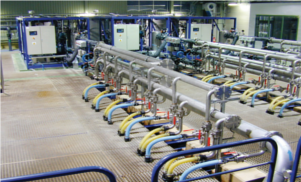What is Municipal Water?
Municipal water falls into two main areas - drinking water and wastewater. Municipalities face the challenge of providing safe drinking water to their communities while also protecting the environment by effectively treating wastewater before it is discharged. While municipal water treatment has existed for centuries, the treatment of drinking water and wastewater has become more difficult due to more contaminants in the water to treat. Monitoring organic contaminants in municipal water can allow for efficient and proper treatment methods to support quality standards and discharge compliance.
What Are Municipal Water Treatments?
Municipal water treatments require multiple steps depending on the source water and whether the final process is drinking water treatment or wastewater treatment.
Municipal drinking water treatment can include:
- Primary treatment of the source water with screens, ultrafiltration membranes, and clarifiers.
- Depending on what is still in the water after the primary treatments, it may require further treatment using reverse osmosis or EDR to treat the microscopic soluble contaminants.
- Disinfection is often the final polishing step using ozone or ultraviolet technologies to safeguard against contaminants reaching communities through the drinking water.
Municipal wastewater treatment also includes many steps such as:
- Primary - solids removal with screens and grit removers
- Secondary - removal of organics and nutrients with MBR, MBBR or MABR technologies
- Tertiary - to produce high quality effluent using ultrafiltration membranes or high-efficiency clarifiers
- Disinfection/oxidation eliminate pathogens in water by using ultraviolet disinfection or ozone
What Filtration Methods Are Used When Treating Municipal Water?
Filtration methods for treating municipal water effectively can range from particle filtration to membrane filtration to biological treatment. Depending on the ultimate quality of water needed, municipal water treatment can incorporate both equipment and chemicals to achieve the desired results.
- Multi-media filters - reduce solids, lower downstream loading/fouling. increase membrane life and lower overall costs. We offer these through our Asset Services business.
- Cartridge depth filters - maximize suspended solids removal ahead of membrane systems to lower operational costs
- Ultrafiltration membrane systems provide direct filtration of source water and as high quality pretreatment for reverse osmosis.
- Reverse osmosis membrane systems provide high quality municipal water which remove soluble contaminants such as lead, arsenic, nitrates, etc.
- Electrodialysis Reversal or EDR membrane systems for drinking water has lower operating costs than traditional RO when municipal water charges exceed $0.20/m3.
- To protect your membranes Veolia offers a full range of membrane protection chemicals such as antiscalants & antifoulants, membrane biological control, membrane cleaners and pretreatment chemicals.
Regardless of what your municipal water treatment needs are, Veolia has solutions to meet your toughest challenges. With complete solutions for municipal wastewater treatment, including primary, secondary, tertiary and disinfection products -alongside water quality monitoring tools - Veolia is here to keep your wastewater treatment facility operating safely and within discharge limits.

